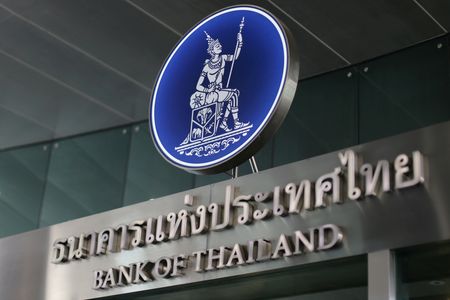BANGKOK (Reuters) – The following is a statement from the Bank of Thailand after it unanimously raised its key interest rate by 25 basis points to 1.50% on Wednesday, as expected by economists in a Reuters poll.
Piti Disyatat, Secretary of the Monetary Policy Committee (MPC), announced the outcome of the meeting on Jan. 25, as follows:
The Thai economy will continue to gain traction with continued recovery in tourism and private consumption thanks to the return of Chinese tourists. Meanwhile, merchandise exports will slow down this year but are expected to improve in 2024 in line with the global economic recovery.
Headline inflation is expected to decline, whereas core inflation remains at a high level with increased risks from demand-side inflationary pressures due to the economic recovery. The Committee deems that a continuing gradual policy normalization is an appropriate course for monetary policy consistent with the growth and inflation outlook, and thus votes to raise the policy rate by 0.25 percentage point at this meeting.
The Thai economy is projected to continue growing. The tourism sector will exhibit a faster recovery following the return of Chinese tourists. This will contribute to a more broad-based improvement in employment and income of services sector and self-employed workers, which account a significant share of total employment. Such improvements will support the continued expansion of private consumption.
Meanwhile, growth of merchandise exports will moderate this year, but is expected to resume in 2024 in tandem with global growth which is projected to bottom out in 2023. The Committee assesses that downside risks to the global economy have decreased given the improving outlook in both advanced economies and China.
Headline inflation is projected to decline. Supply-side inflationary pressures will continue to dissipate along with a decline in global energy and commodity prices. Core inflation is expected to remain at a high level for some time before gradually decreasing. Meanwhile, medium-term inflation expectations remain anchored within the target range.
However, there is a risk that core inflation would remain high for longer than expected owing to a potential increase in pass-through given elevated costs. Moreover, the tourism recovery could increase demand-side inflationary pressures. The Committee will therefore continue to closely monitor risks to inflation.
Overall financial system remains resilient. Commercial banks maintain high levels of capital and loan loss provision. Debt serviceability of households and businesses has improved in line with the economic recovery. However, the financial positions of some SMEs and households remain fragile and sensitive to the rising living costs and debt burden.
The Committee views that financial institutions should continue to press ahead with debt restructuring and deems it important to have targeted measures and sustainable solutions in place for vulnerable groups.
Overall financial conditions are less accommodative. Funding costs have risen in tandem with the policy rate increases as well as the expiration of reduction in the Financial Institutions Development Fund (FIDF) contribution.
However, bank lending and bond issuances continue to increase. The baht against the US dollar has appreciated owing to expectations of a less aggressive tightening of the Fed as well as China’s relaxation of international travel restrictions which would benefit the Thai tourism sector. Nevertheless, the Committee will continue to closely monitor developments in the financial market and volatilities in the foreign exchange market.
Under the monetary policy framework with objectives of maintaining price stability, supporting sustainable and full-potential economic growth, and preserving financial stability, the Committee judges that Thai economic recovery remains on track.
However, risks of rising demand-side inflationary pressures must be monitored. The policy rate should be normalized to the level that is consistent with sustainable growth in the long term in a gradual and measured manner. The Committee is ready to adjust the size and timing of policy normalization should the growth and inflation outlook shift from the current assessment.
(Editing by Martin Petty)

